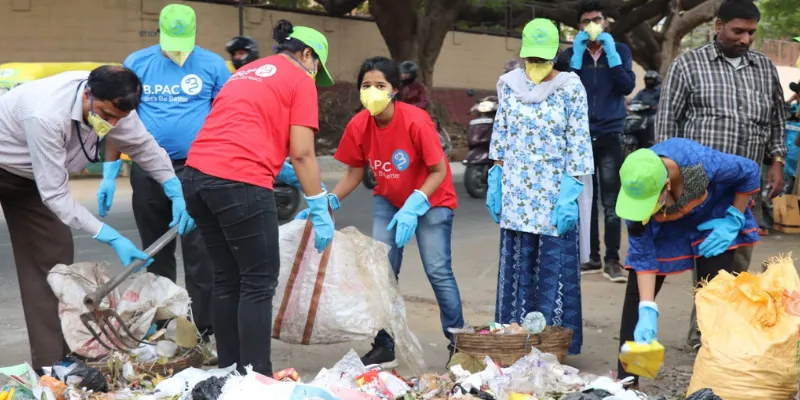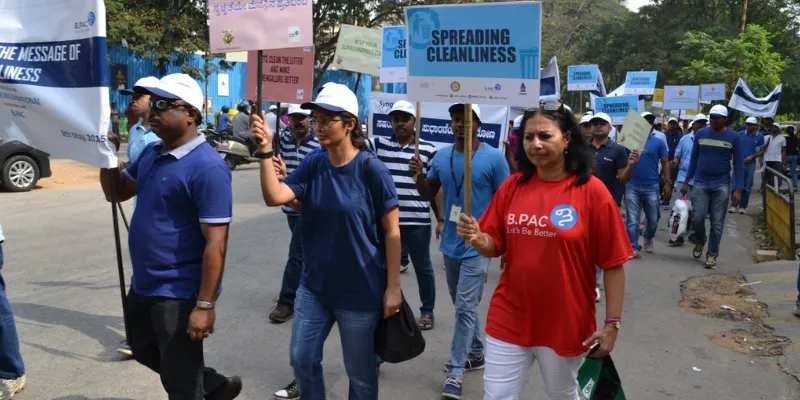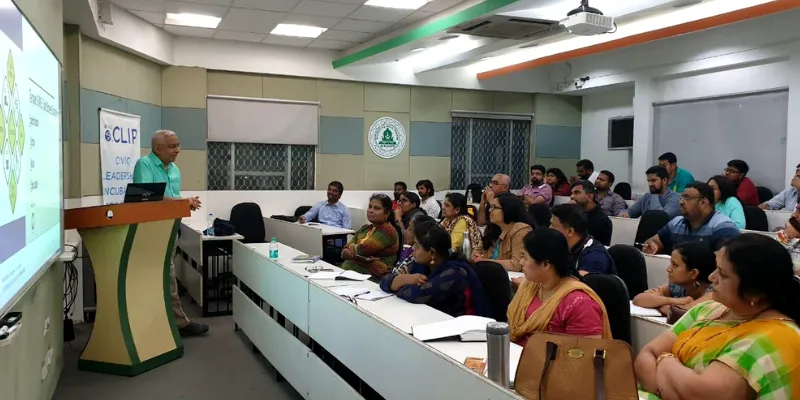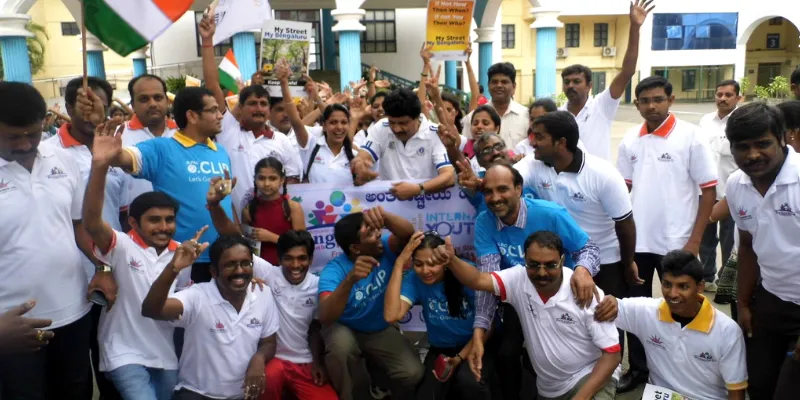How to be a politician 101
The B.PAC Civic Leadership Incubator Programme (B.CLIP) aims to 'improve the governance of Bengaluru and enhance the quality of life of its citizens' with a nine-month crash course in local governance. It is now training its sixth batch of citizen-politicians.

At the BCLIP graduation day
Sampath Kumar wanted to make auto drivers and passengers in Bengaluru feel safer. He was instrumental in making it mandatory for every auto rickshaw in the city to carry an information board with the driver’s details displayed. Another Bengaluru resident, Jayalakshmi Karthik, helped women from poor economic backgrounds learn how to drive so that they could find secure jobs. Kavita Reddy, “a lake restorer”, helped rejuvenate the once 149 acre-long Agara Lake by installing a sewage treatment plant. However, none of these civic leaders were politicians. Sampath was an autorickshaw driver. Jayalakshmi was an activist and homemaker. Kavita was an environmentalist.
These citizen leaders worked in different sectors, but they shared a common aim: making Bengaluru a better and safer city.
Enabling them in their dream is a unique political incubator, the B.PAC Civic Leadership Incubator Programme (B.CLIP), an initiative by the Bangalore Political Action Committee (B.PAC). The committee was founded in 2013 by a group of Bengalureans, including prominent names such as Kiran Mazumdar Shaw and TV Mohandas Pai, to “improve the governance of Bengaluru and to enhance the quality of life of its citizens”.

BCLIP leaders: Sampath Kumar, Jayalakshmi, and Kavita Reddy
“We found that most of the city's problems lie at the lowest tier of governance (corporation’s ward level) -- felled trees, broken water lines, leaking sewage lines, garbage on the streets, potholes on the roads, lack of footpaths, to name a few,” says Revathy Ashok, Managing Trustee and CEO of B.PAC. “So we decided to fix the ward requirements, and that was the genesis of the political incubator, B.CLIP,” she says.
Launched in 2014, the free, nine-month programme, B.CLIP, is presently running its sixth batch. Till date, 270 students have graduated and undertaken over 150 civic projects across the city. Some of the programme’s prominent alumni include the present Jayanagar Member of Legislative (MLA) Soumya Reddy.
A school for politician-public engagement
Indian cities are plagued with multiple civic problems: potholes, poor road infrastructure, traffic congestion, mountains of garbage on the road, inadequate access to public toilets, broken sewage plants, water woes, among many others.
Often, we complain about the lack of accountability displayed by our elected representatives. At such times, we feel helpless because we’re unable to affect change ourselves. Apart from being armchair critics, rarely do we engage in matters of civic governance.
"To think that somehow the government is magically going to solve all our problems while the citizens remain disengaged is not going to work,” Revathy says.

BCLIP participants at a cleanliness drive.
What could work was a programme that would provide a crash course on civic engagement to aspiring politicians, local leaders, citizen activists, and residents who want to better their city. Out of this idea, B.CLIP was launched.
The parent organisation, B.PAC, Revathy says, has created an able cadre of problem solvers. Their aim is to create and nurture a consciousness among citizens to change their behaviour in order to create sustainable and long-lasting change. For instance, in case of a garbage pile up on the road, the government agencies can clean up the garbage once, but if the citizens don’t practise good garbage disposal behaviour, the action is not sustainable.
“Civilian engagement is important because in any society you have pulls and pushes. You will never have solutions acceptable to all. If you will not engage, democracy will still be alive, but somebody else’s voice will take precedence. If you want your voice to be heard, you have to use all the tools of democracy available to you,” Revathy adds.

Revathy Ashok at a BPAC cleanliness drive.
Also read: Stop blaming, fix potholes yourself. With 4,500 potholes fixed, PotholeRaja shows how
The B.CLIP model
B.CLIP was built on the premise that Bengaluru needs a community of problem solvers who are trained to bridge the gap between elected representatives and citizens, understand the problem, address it with help of experts, mobilise citizens and support parastatal agencies to meet the needs of citizens.
Under this initiative, B.PAC selects, trains, and supports “talented individuals” who wish to transform their city by contesting municipal corporation elections. By equipping these individuals with skills in public policy analysis, municipal administration, political landscape and election campaign dynamics, the incubator project creates a pipeline of candidates that B.PAC and other civil society organisations “find suitable to endorse for the future elections.”

BCLIP participants attend a State Assembly Session.
“It (B.CLIP) is a very rigorous programme requiring 100 recommendations of people from within your ward. This endorsement is important because this is a free nine-month programme. We want to make sure that we are spending money wisely on people who actually work to improve the situation at the ward level,” Revathy says.
About 60 to 80 participants are selected after a thorough and defined selection procedure and separated into batches to go through the program. The programme is divided into two phases. For the first three months, participants undergo 96 hours of training and study of topics including urbanisation, policy engineering, economic reasoning, and decision-making in the government. The final six months are spent on field work, where participants create a vision for their ward, set up a small office, and work with multiple stakeholders to fix the problem in their locality in real time.
Also read: Facebook ties up with Election Commission to remind young Indians to vote
Creating impact

At a knowledge sharing session.
B.CLIP helps civic leaders have a collective vision of shared knowledge and resources for citizens to work in their respective areas. These individuals are supported by a network of national political leaders, the city municipality, urban planners, lawyers, entrepreneurs and industrialists, subject experts, and academicians through knowledge sessions, seminars, and connections. One example of these systems working in symphony is the story of businessman-turned-civic leader, Mohammed Saleh Sufyan.
“I used to be anguished by the high usage of plastics in the city. That’s when I started the Plastic-Free Ramzan campaign,” Mohammed Saleh Sufyan, a B.CLIP alumni says.
Ramzan witnesses a large number of street hawkers and mobile food carts that use single-use plastic. From plastic plates, spoons, and glasses to low-quality plastic bags wrapping take-away foods, these non-compostable materials not only lead to garbage pile-ups on the streets, but also choke our landfills.

B.CLIP leaders support and participate in fellow batchmates' initiatives and civic projects.
To combat this issue, in 2016, Sufyan began to interact with mosque officials in Shivajinagar over the possibility of using biodegradable plates and cutlery as an alternative. What began as a small step with a single mosque in his locality soon spread across Bengaluru.
Sufyan led multiple discussions with other clerics, food vendors, and even managed to get the Bruhat Bengaluru Mahanagara Palike (BBMP), the city’s municipal corporation, on board to ensure that waste generated during the festival period would be segregated and cleared by the pourakarmikas, the street cleaners.
“I could pull this off for two years and it is because of the support I have received,” he says.
Similar to Sufyan’s, stories of leadership and change echo across the narratives of B.CLIP alumni, who have utilised the programme to further their goals for citizen-led participative governance work, and have been the change they wished to see in their city.






